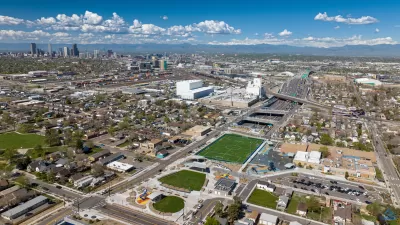The American Civil Liberties Union is not pleased with the potential civil rights infringement enacted by a new directive by Denver Parks and Recreation.

"After an increase in drug use along the Cherry Creek trail and in city parks, Denver Parks and Recreation issued a new directive to ban people caught using and dealing drugs," reports Fox31.
The temporary directive allows Denver Parks and Recreation "to give 90-day park suspensions, effectively banning anyone caught buying, selling, using or possessing illegal drugs for three months," following increasing complaints about heroin use on the Cherry Creek bike path.
The directive describes more leeway to suspend individuals from the park than that summary allows. In the words of the directive, "The person subject to the Suspension Notice need not be charged, tried or convicted of any crime, infraction, or administrative citation in order for the Suspension Notice to be issued or effective."
The American Civil Liberties Union of Colorado has already taken to Facebook to express its concern with the directive, citing a "massive civil liberties problem."
One, the Constitution guarantees that you don't get punished in this country based on accusations alone without a right to defend yourself. It's called due process. Two, Denver has engaged in constant and continuous sweeps to push homeless people out of public spaces for months. There can be no public trust that this new power of unilateral banishment will be used justly and without abuse.
Hat tip to Jen Kinney for sharing news of the directive and its corresponding controversy.
FULL STORY: Anyone caught dealing, using drugs to be suspended from Denver parks

Alabama: Trump Terminates Settlements for Black Communities Harmed By Raw Sewage
Trump deemed the landmark civil rights agreement “illegal DEI and environmental justice policy.”

Planetizen Federal Action Tracker
A weekly monitor of how Trump’s orders and actions are impacting planners and planning in America.

The 120 Year Old Tiny Home Villages That Sheltered San Francisco’s Earthquake Refugees
More than a century ago, San Francisco mobilized to house thousands of residents displaced by the 1906 earthquake. Could their strategy offer a model for the present?

In Both Crashes and Crime, Public Transportation is Far Safer than Driving
Contrary to popular assumptions, public transportation has far lower crash and crime rates than automobile travel. For safer communities, improve and encourage transit travel.

Report: Zoning Reforms Should Complement Nashville’s Ambitious Transit Plan
Without reform, restrictive zoning codes will limit the impact of the city’s planned transit expansion and could exclude some of the residents who depend on transit the most.

Judge Orders Release of Frozen IRA, IIJA Funding
The decision is a victory for environmental groups who charged that freezing funds for critical infrastructure and disaster response programs caused “real and irreparable harm” to communities.
Urban Design for Planners 1: Software Tools
This six-course series explores essential urban design concepts using open source software and equips planners with the tools they need to participate fully in the urban design process.
Planning for Universal Design
Learn the tools for implementing Universal Design in planning regulations.
Clanton & Associates, Inc.
Jessamine County Fiscal Court
Institute for Housing and Urban Development Studies (IHS)
City of Grandview
Harvard GSD Executive Education
Toledo-Lucas County Plan Commissions
Salt Lake City
NYU Wagner Graduate School of Public Service





























